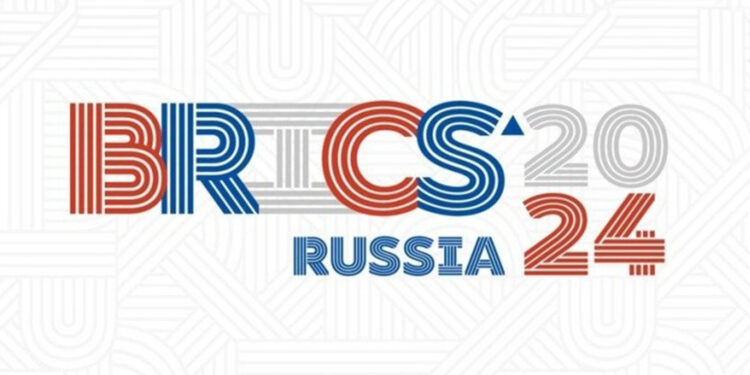Moscow- The two-day summit of the BRICS group of countries will begin on October 22 in Kazan, the capital of the Republic of Tatarstan.
Russia sent invitations to attend the summit to 38 countries, whether members of the group or countries wishing to cooperate with it, according to Russian Deputy Foreign Minister Sergei Ryabkov, who confirmed the attendance of representatives of 32 countries. Among them, 24 will participate at the leadership level, including Russia’s closest neighbors in the Eurasian Economic Union and the CIS.
Wide presence
It is expected – according to the Russian official – that the heads of regional organizations and executive bodies of relevant organizations will attend the summit, pointing out that such a number of world leaders have never met in Russia at the same time.
As of January 1 of this year, the duties of the presidency of the BRICS group were transferred to Russia after President Vladimir Putin approved in November 2023 the concept of the Russian presidency of the group, which includes a list of priorities and defines work directions for the coming year, which stipulates including: This requires the establishment of an organizational committee to prepare and ensure Russia’s presidency of BRICS, led by Yuri Ushakov, Assistant to the Russian President.
Russia is seen as the most dynamic party in the group, seeing it as a symbol of the transition from unipolarity to a more equitable world, as described by President Putin in an article published on the eve of the 2012 presidential elections.
The Russian approach to forming an international platform based on a new foundation in international relations can be summarized by saying that the global governance mechanisms that were created in the wake of World War II, such as the United Nations, the Bretton Woods system (the common name for the International Monetary Conference that was held in 1944 in the United States of America) and even ” GATT (World Trade Organization) is losing its effectiveness, and the global economic model, based on the dominance of financial capital and market fundamentalism, is becoming obsolete.
In addition, there is a growing feeling towards “anti-hegemony” and not only in the developing world. However, Moscow realizes that this process faces many complex factors, from the technological and social backwardness of the countries of the East to deliberate sabotage on the part of the West.
Big bets
The BRICS presidency is a rotating exercise in which each member country leads the group for a year. As one of the main founding countries of the group, Russia has held this position several times. An important moment in the history of Russia’s presidency of the alliance was 2015 when it was agreed to establish a new development bank ( BRICS Bank) and foreign exchange reserve pool.
BRICS is an intergovernmental association of countries classified as having high potential for economic growth and development. It was formed in 2006 and its name is an abbreviation made up of the first letters of the names of its founding countries, which are Russia, Brazil, India, China and South Africa, a term proposed by economist Jim O’Neill in 2001 to indicate countries with the most dynamic economies.
The group was established as part of the St. Petersburg Economic Forum with the primary goal of joint cooperation in the fields of economics, politics, security, as well as humanitarian development and is often called by the member states the alliance.
In the face of unilateralism
One of the most prominent tasks of the group’s countries is to overcome the emerging financial and economic crises, improve the standard of living of the residents of the participating countries, and move from dependence on raw materials to high-tech production.
The constituent parties say that they seek to build relations on the basis of the United Nations Charter and international law, and the basic principles to which the organization is committed are openness, realism, solidarity in decisions, and neutrality towards third parties.
The group also aims to create a stable and favorable economic environment for members, as well as develop trade and stimulate mutual investment. It also works to establish relations between banks and use the national currency in mutual settlements.
Since 2024, the member states of the group have been trying to present a united front on major international issues, striving to make the global community multipolar and emphasizing joint work to develop health care and improve the level of education and social protection.
Geopolitical expansion
- The group currently consists of Brazil, Russia, India, China, South Africa, Egypt, Iran, UAE, Saudi Arabia and Ethiopia.
Argentina was a candidate to join the group, but the arrival of Javier Miley to power in the South American country in 2023 ended this desire.
Given the continued growth of the influence of BRICS on the global stage, a number of countries have expressed their desire to join the association: Turkey, Algeria, Azerbaijan, Bolivia, Bangladesh, Belarus, Bahrain, Vietnam, Honduras, Venezuela, Zimbabwe and Indonesia, as well as Cuba, Kuwait, Kazakhstan, Morocco, Nicaragua, Nigeria, Pakistan, Equatorial Guinea, and also Senegal, Syria, Uganda and Chad. Sri Lanka, Eritrea and South Sudan.
- The countries of the group represent about a third of the world’s land area, more than 45% of the planet’s population live in them, and they contain about 45% of its oil reserves.
- These countries produce approximately 30% of the global GDP and hold more than 17% of the world’s gold reserves in their banks.



